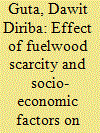| Srl | Item |
| 1 |
ID:
136232


|
|
|
|
|
| Summary/Abstract |
In Ethiopia biomass is predominantly utilized for household energy needs often using inefficient rudimentary stoves which cause adverse environmental and welfare effects. This paper examined the contribution of biomass resources to rural household energy use and energy substitution. The analysis applied the ordinary least square in the final stage estimation of fuelwood and overall biomass energy consumption by using predicted shadow prices. The paper used Tobit model to estimate charcoal and agricultural fuel consumption due to the presence of censoring. An increase in fuelwood shadow price was associated with reduced household fuelwood consumption with price elasticity of −0.38. The cross price elasticity between fuelwood and agricultural fuels revealed no evidence of energy substitution, which conforms to the findings of previous studies. Household access to electricity was associated with lower household biomass energy utilization but kerosene was not fuelwood substitute. Household energy use conformed to the ‘fuel stacking’ or ‘multiple fuel use’ concept, but households preferred modern energy options as welfare increased in areas where modern energy is available. This suggests that there is a promising prospect for fuel-transition, but access to modern energy and economic growth have key roles. The findings suggest that a concerted policy effort is required that would help diversify rural livelihoods, improve living standards and encourage economic growth, encourage inter-fuel substitution through improved modern energy access and afforestation to increase biomass supply.
|
|
|
|
|
|
|
|
|
|
|
|
|
|
|
|
| 2 |
ID:
170096


|
|
|
|
|
| Summary/Abstract |
By using the survey data of China’s rural households from 2003 to 2009, we identified the determinants of renting in and out the plots and estimated their impact on household welfare. First, we developed a bivariate dynamic probit model for the behaviors of renting in and out to manage the impact of the intertemporal decision-making that has been somewhat ignored by the literature; next, we developed a panel multiple endogenous treatment effect model for land rental impact to manage the self-selection problem stemming from the unobserved variables. The results show that regardless of renting in or out, both scenarios have statistically significant positive effects on the net income and balance of disposable financial assets, and renting out also has a significant positive effect on consumption expenditure.
|
|
|
|
|
|
|
|
|
|
|
|
|
|
|
|